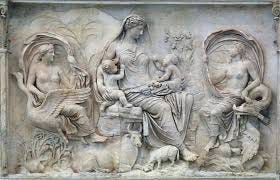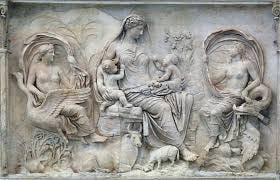In my previous post, I retold the Creation myth of Greek Mythology. One figure from that tale that fascinated the hell out of me was Gaia. She was not the typical womanly role I am used to reading about in mythologies this old. So, in this post, I will argue whether Gaia is a feminist icon or not.
Patriarchy vs. Matriarchy
One of the rather interesting observations I had while researching was the way each person tried to tell the same story.
For example: in Hesiod’s version of the story, Gaia is the one that gave birth to all the gods (besides Chaos) and she is also somewhat responsible for Uranus’ demise. It was her plan, after all.
In Apollodorus’ version, however, the myth starts with the claim that Sky (Uranus) ruled the world and he married the Earth, framing the story in a much more patriarchal lens.
Many scholars, such as Robert Graves, see Hesiod’s version as the more patriarchal one. I don’t personally see it like that. To me, Hesiod’s version seems far more matriarchal in nature. I think the reason why people point to it as a patriarchal myth is simply due to all the castration and the fact that it is Cronos who cuts down his father. I suspect that many scholars might see Gaia as more of a conniving woman in this tale, spinning schemes in the shadows, but to me it feels less like that and more like a woman who isn’t afraid to stand up to her own husband. There is one instance where it feels slightly patriarchal: when it is hinted that Gaia alone could not have killed her husband on her own, so she seeks the help of her children. What many people miss out on, however, is the fact that she asks all of them—both the men and the women.
Another thing to note here is that the castration, in my humble opinion (please don’t kill me, Greek myth experts), symbolizes another rather feminist point. I believe many readers of Greek myths might see this as a masculine act of Cronos taking control from his father by castrating him and ascending to the throne himself—a rite of passage for any boy to become a man by surpassing his father. But to me, it feels more like a warning to those who get too comfortable in their power. Let’s break it down a bit, shall we?
First of all, the whole plan is thought up by Gaia herself. She merely recruits Cronos to do her work. Secondly, she’s the one who creates the sickle for him. Thirdly, the reason for Uranus’ castration wasn’t because of any male competition, but rather the fact that he was constantly hurting Gaia. He kept pushing the children into her womb, and this was both emotionally and physically abusive. Instead of a fable of a woman who bears the abuse of her husband and shows resilience through silence like so many others, she breaks free by planning to murder her husband.
This is quite a surprising theme to me. I wonder if this is how Greeks saw mother figures—someone not to be messed with?
Apollodorus’ telling is vastly different, though. While the story beats are almost the same, he makes one single distinction that feels rather important to me: he opens the story with the fact that it was Sky who ruled first. This changes the entire framing of the story. I believe this is because it was written quite a while later than Hesiod’s version.
Multiple Versions and Interpretations
According to Robert Graves, there used to be an older version of the myth, now found only in fragments, that tells the tale of a goddess who separated the sky from the sea, danced on the ocean, and then made love to a snake called Ophion. This goddess was called Eurynome. He also recounts several other versions of this myth as well.
His argument is, as far as I could gather (sometimes it gets a bit harder to decipher what he’s getting at), that the Greek creation myth was far more matriarchal and that the people who lived here before the Greeks—whom we now call the ‘Pelasgians’—merged their beliefs of a matriarchal protective mother with those of a patriarchal vengeful god, thus creating the union between Uranus and Gaia. Over time, however, the myth got distorted, with elements such as the introduction of Eros influencing the narrative, and Gaia became almost non-existent in later retellings.
There are two issues I have with this theory, however. Yes, it is true that in later myths it is written in a rather different way than what Hesiod put down (which itself was an amalgamation of different myths from the area in which Hesiod resided). But the first issue I could find is that Robert Graves recounts the myths in a vastly different way than what I have read them in the original texts. His version of Hesiod’s retelling is very different from the actual text to me. Secondly, I could not find any sources (yet) of any invasion or reconciliation of differing belief systems, nor could I find any sources for the Pelasgian myth. Some even go as far as to say that Graves invented this myth to support his narrative of a matriarchal goddess who influenced Greek mythology.
If, later on, I find any evidence to the contrary, I will surely make another post on it. For now, I believe there is ample evidence to support the idea that yes, Gaia is most definitely a feminist icon.






So, Gaia's back is she? I remember the"scandal" of feminist wiccan communities substituting Mary for Gaia when I was in seminary
Makes great sense, thanks.